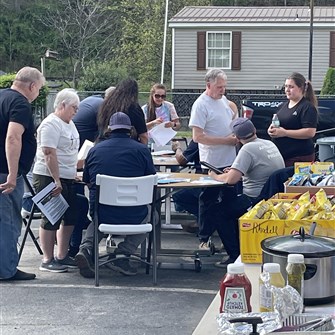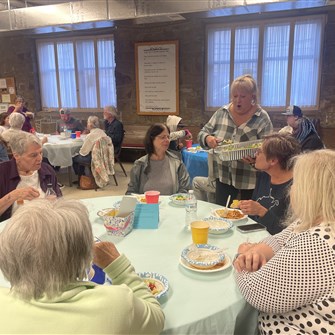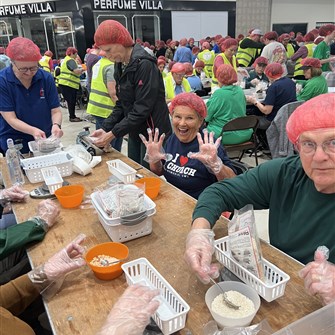News

Constitutional Amendment Information Part 4: Educational Requirements for Clergy Members
WVUMC
Jun 04, 2025
Amendment 4 to be considered by annual conferences is titled “Educational Requirements for Clergy ...

June 15th is Peace with Justice Sunday
Justice and Advocacy
WVUMC
Jun 04, 2025
United Methodist Churches traditionally observe Peace with Justice Sunday on the first Sunday after ...

Small Church Gathering
Congregational Vitality
WVUMC
Jun 04, 2025
Registration is now open! The West Virginia Conference in partnership with the Holston Conference...

Barry Moll Memorial Golf Scramble
WVUMC
Jun 03, 2025
Register now to participate in the 2025 Rev. Barry Moll Memorial Golf Scramble to support the work ...

Become a Certified Discipleship Coach
Congregational Vitality
WVUMC
Jun 03, 2025
Support congregational members in their spiritual growth, help fulfill the church’s mission of ...

Upshur Parish House School Supplies Drive
Justice and Advocacy
WVUMC
Jun 03, 2025
The Justice and Advocacy and WVUMC Prays Teams are joining up to support a school supply drive at ...

Academy for Spiritual Formation
WVUMC
May 20, 2025
Since 1983 The Upper Room has offered the Two-Year Academy for Spiritual Formation® as an in-depth ...

Constitutional Amendment Information Part 3: Racial Justice
Annual Conference 2025
Justice and Advocacy
WVUMC
May 20, 2025
Amendment 3 to be considered by annual conferences is titled “Racial Justice.” Article V of the ...

Hope in the Mountains, Dig Deep Helping Raleigh County Community
Justice and Advocacy
WVUMC
May 20, 2025
On an unusually warm late-April afternoon in Rhodell, representatives from Hope in the Mountains, ...

Consider How You Can Support Efforts to End Hunger Insecurity in West Virginia
Justice and Advocacy
WVUMC
May 07, 2025
Hunger grants are awarded each year and support food pantries and other agencies that help the ...

Constitutional Amendment Information Part 2: Inclusiveness of the Church
Annual Conference 2025
WVUMC
May 07, 2025
This is the second in a series of informational articles about the proposed Constitutional ...

Portico Leaderboard Contest
Congregational Vitality
Portico
WVUMC
May 06, 2025
Congratulations to all of our learners who completed courses on Portico during our Leaderboard ...

Southern District Hosts Dinner Church Educational Event
Congregational Vitality
Southern District
WVUMC
May 06, 2025
Members of United Methodist churches and guests in the Southern District gathered Sunday, April 27, ...

Year of the Child on Display at Annual Conference
Annual Conference 2025
Justice and Advocacy
WVUMC
Youth & Youth Adults
May 06, 2025
If your church would like to make paper doll chains to be displayed at Annual Conference, please ...

Church of the Wild
WVUMC
Apr 23, 2025
A Ministry of Elizabeth Memorial UMC Funded in part by the United Methodist Foundation of West ...

Students Wrap Up Pastoral Ministry Licensing School
WVUMC
Apr 23, 2025
“Licensing school will be like a part-time job,” they had been warned. And there they were, sitting ...

Connectional Table works on regionalization ratification and visioning for the church
Annual Conference 2025
WVUMC
Apr 22, 2025
Since January 2023, I have served as the Chief Connectional Ministries Officer for the Connectional ...

Nine Rivers District Rise Against Hunger
Glory Sighting
WVUMC
Apr 22, 2025
The following Nine Rivers District Churches (Bethesda, Cross Roads, Christ, Dillon Chapel, First ...

WVUMC Cabinet Join Efforts to Support Year of the Child at AC
Justice and Advocacy
WVUMC
Apr 22, 2025
Last year’s annual conference featured origami peace doves tied to a featured breath prayer and ...

Mission in Motion Step Challenge Complete!
WVUMC
Apr 21, 2025
The Mission in Motion Lenten Step Challenge has been completed. The Wellness Team would like to ...

2025 Lay Academy Class Offerings
Greenbrier Wesleyan District
Lay Ministry
Little Kanawha District
MonValley District
Nine Rivers District
Northern District
Potomac Highlands District
Southern District
WVUMC
Apr 15, 2025
Download the 2025 lay academy course offerings. 2025 Lay Academy Courses →

Camping Team Retreat – A time of learning, dreaming, and fun
Spring Heights
WVUMC
Youth & Youth Adults
Apr 09, 2025
The WV Annual Conference Camping Team recently held a retreat at Spring Heights Camp and Retreat ...

Disciple Like Jesus
Congregational Vitality
WVUMC
Apr 09, 2025
We are excited to offer a series of online sessions with Dr. Phil Maynard of EMC3 Coaching based on ...

Nicaea at 1700 LARCUM 2025 Planned
WVUMC
Apr 09, 2025
LARCUM 2025 will gather May 12-14, 2025 at Saint John XXIII Pastoral Center, Charleston, WV, under ...

West Liberty Spring Trip
Collegiate Ministries
WVUMC
Youth & Youth Adults
Apr 09, 2025
Building relationships – providing a community – engaging in the world around us --- These are the ...